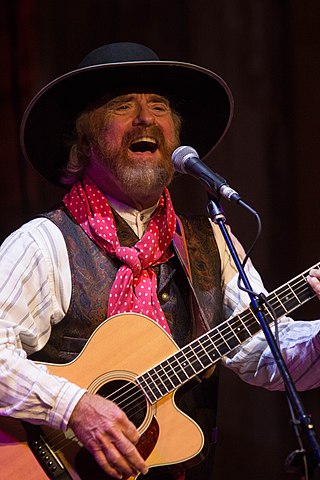
Michael Martin Murphey is an American singer-songwriter. He was one of the founding artists of progressive country. A multiple Grammy nominee, Murphey has six gold albums, including Cowboy Songs, the first album of cowboy music to achieve gold status since Gunfighter Ballads and Trail Songs by Marty Robbins in 1959. He has recorded the hit singles "Wildfire", "Carolina in the Pines", "What's Forever For", "A Long Line of Love", "What She Wants", "Don't Count the Rainy Days", and "Maybe This Time". Murphey is also the author of New Mexico's state ballad, "The Land of Enchantment". Murphey has become a prominent musical voice for the Western horseman, rancher, and cowboy.

The Ballad of Calico is the eighth studio album by Kenny Rogers and the First Edition and released as Reprise Records 6476. It reached No. 118 on the albums chart and produced one single, "School Teacher", which reached No. 91. The double album was released in February 1972. The album is a country-rock concept album about the real-life town of Calico, California. The entire double album was written by Michael Murphey and Larry Cansler and the songs tell the stories of individuals who lived in the town.

¡Viva Terlingua! is a progressive country album by Jerry Jeff Walker and The Lost Gonzo Band. It was recorded in August 1973 at the Luckenbach Dancehall in Luckenbach, Texas, and released three months later, in November 1973, on MCA Nashville Records. The album captures Walker's strived-for "gonzo country" sound, a laid-back country base with notes of "outlaw" rock, blues, and traditional Mexican norteño and Tejano styles. The album was mostly recorded live in the dancehall without an audience over several days, but two songs were recorded live with an audience.
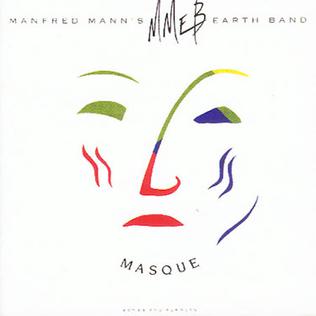
Masque is the thirteenth studio album by Manfred Mann's Earth Band, released in 1987 on Virgin Records. Chris Thompson had left the band after their previous album Criminal Tango and the band was now at three permanent members. After this album the Earth Band name was retired until 1991.

Will the Circle Be Unbroken: Volume Two is the nineteenth studio album by American country folk group Nitty Gritty Dirt Band, released on May 1, 1989. The album follows the same concept as the band's 1972 album, Will the Circle Be Unbroken, which featured guest performances from many notable country music stars.
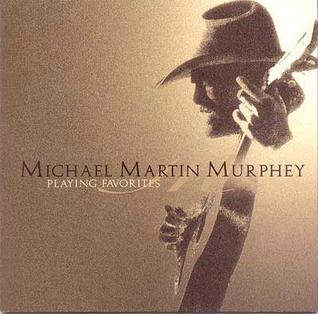
Playing Favorites is the twenty-third album by American singer-songwriter Michael Martin Murphey. Released August 21, 2001, the album features completely new recordings of eleven of the artist's country, cowboy, and popular crossover classics, as well as one new song. In his liner notes, Murphey writes that "songs are like children; they grow, evolve, change with time." The concept behind Playing Favorites was to document the growth and evolution of his best-loved tunes, using many new musicians and modern recording techniques not available when the original recordings were done.

Cosmic Cowboy Souvenir is the second album by American singer-songwriter Michael Martin Murphey. According to AllMusic, this album established Murphey as a progressive country musician. Murphey's impact on the genre was as such that one of the many names for the genre, "Cosmic Cowboy music", was taken from Murphy's "Cosmic Cowboy, Pt. 1", a song that appears on this album. The album peaked at number 196 on the Billboard 200.

Blue Sky – Night Thunder is the fourth album by American singer-songwriter Michael Murphey and is considered one of the seminal albums of his career. Released in 1975, it produced two major hit singles—the platinum-certified "Wildfire" and "Carolina in the Pines"—and established him as a major force in popular music. Members of the Nitty Gritty Dirt Band provided backing on some of the tracks.

Michael Murphey is the third album by American singer-songwriter Michael Martin Murphey and his first for Epic Records, released in 1974.
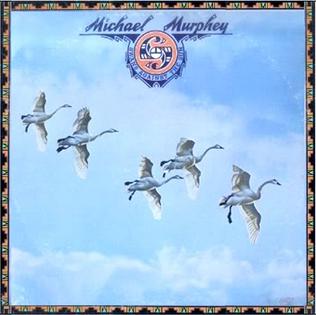
Swans Against the Sun is the fifth album by American singer-songwriter Michael Martin Murphey released in late 1975. The album features performances by John Denver, Charlie Daniels, and Willie Nelson, and peaked at number 44 on the Billboard 200.

Sagebrush Symphony is the nineteenth album by American singer-songwriter Michael Martin Murphey, his second live album since his 1979 live/studio album Peaks, Valleys, Honkytonks and Alleys, and his first album with a symphony orchestra. Recorded live with the San Antonio Symphony Orchestra, this ambitious album, which presents cowboy songs and poems in a symphonic setting, contains a selection of Murphey's most popular songs, as well as traditional cowboy music. Murphey turns in "an impassioned performance" and the inclusion of guest artists Sons of the San Joaquin, Ric Orozco, Herb Jeffries, and Robert Mirabal "adds to the musical diversity and richness of the album."

Cowboy Songs is the sixteenth album by American singer-songwriter Michael Martin Murphey and his first album of cowboy songs. The album peaked at number 25 on the Billboard Top Country Albums chart.

Tonight We Ride is the twelfth studio album by American singer-songwriter Michael Martin Murphey and his first for Warner Bros. Records. Released in 1986, the album was produced by Jim Ed Norman and contains guest performances by Holly Dunn, Reggie Young, Mark O'Connor, Charlie McCoy, and JD Souther. The album's title track was also its first single. The album peaked at number 46 on the Billboard Top Country Albums chart.

Hard Country is the ninth album by American singer-songwriter Michael Martin Murphey and his first soundtrack album. The 1981 film Hard Country stars Jan-Michael Vincent and Kim Basinger.

Flowing Free Forever is the sixth album by American singer-songwriter Michael Martin Murphey. The album establishes Murphey's love of wide open spaces and his "desire to let his soul roam freely." The album was not as commercially successful as a few of his earlier releases, but "Murphey's visions and persona remain intact." The album contains the song "Cherokee Fiddle", which was later recorded by Johnny Lee for the film soundtrack for Urban Cowboy. Flowing Free Forever peaked at number 130 on the Billboard 200.

Peaks, Valleys, Honky Tonks & Alleys is the eighth album by American singer-songwriter Michael Martin Murphey and his first live album. The first five tracks were recorded at the legendary Palomino Club in North Hollywood, Los Angeles, an important West Coast country music venue. The remaining five tracks are studio recordings. The live tracks showcase Murphey's early work with some interesting twists. His "Cosmic Cowboy" turns into a breakdown, while "Another Cheap Western" is coupled with The Olympics' 1958 hit, "Western Movies". The album produced the singles "Backslider's Wine" and "Chain Gang" that peaked at numbers 92 and 93 on the Billboard Hot Country Singles chart respectively.
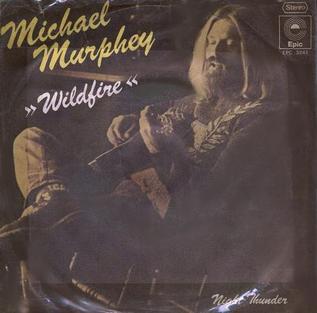
"Wildfire" is a song written by Michael Murphey and Larry Cansler. It was originally recorded by Murphey, who had yet to add his middle name to his recorded work, and appears on his gold-plus 1975 album Blue Sky – Night Thunder.
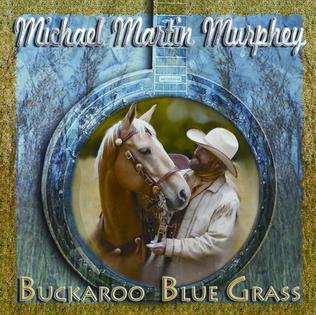
Buckaroo Blue Grass is the twenty-eighth studio album by the American singer-songwriter Michael Martin Murphey, and his first album of bluegrass music.

Campfire on the Road is the thirty-second album by American singer-songwriter Michael Martin Murphey, his second solo performance album, and his fourth live album. The album was recorded live February 28 and March 1, 2011 at the Western Jubilee Warehouse Theater in Colorado Springs, Colorado, and was released February 21, 2012.
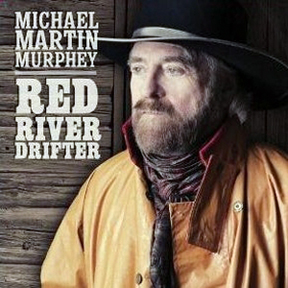
Red River Drifter is the thirty-third album by American singer-songwriter Michael Martin Murphey.




















